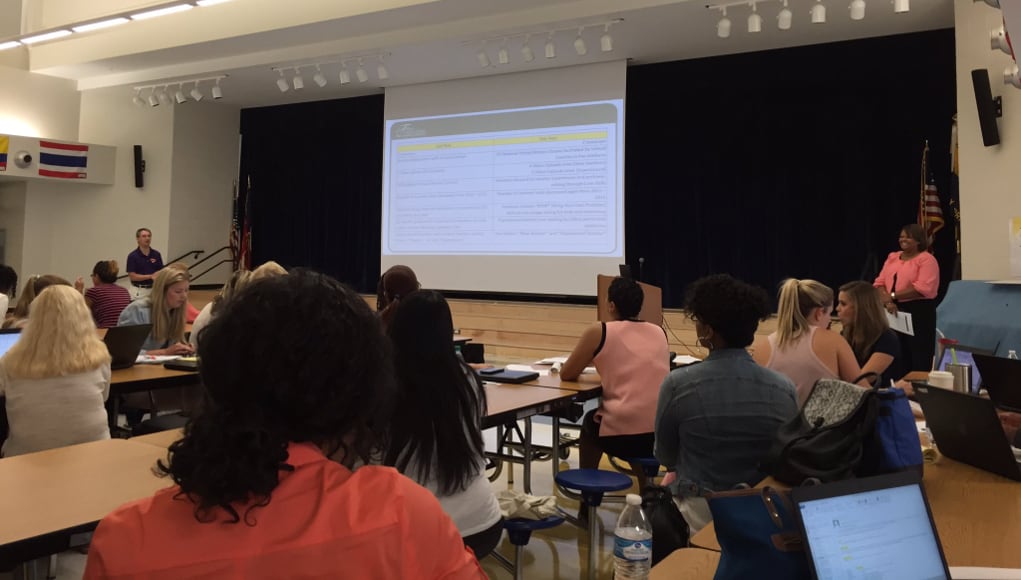New Teacher Induction Approach Blends Virtual Content and Collaboration

By Nathifa Carmichael
After Fulton County Schools in metro Atlanta developed and implemented a rigorous Teacher Selection Model, it was time to turn our energy toward developing a comprehensive approach to teacher induction.
As talent management coordinator for the district, I set out to implement an induction program with wrap around supports that would help us retain new teachers and give them every chance to succeed during critical early years.
Now in its third year, the Growth Opportunity Teacher Induction Program (GO TIP) includes personalized mentoring, professional development customized to identified strengths and weaknesses, and frequent opportunities to collaborate and share experiences with colleagues.
Our program develops new teachers with a range of supports: thoughtfully matched peer mentors, virtual coaching and online training simulations. The real focus of GO TIP is targeting the most important skills, giving new teachers space and time to practice those skills and giving meaningful feedback.
Blended Adult Learning
Fulton County Schools hires about 800 teachers each year for our school district of 96,500 students and 7,000 teachers. New teachers arrive with distinct professional development needs and varying degrees of potential success as a teacher. And statistically, according to the Alliance for Excellent Education, 40-50% will leave the profession within five years. The pool of potential teachers is down in enrollment, teacher prep and applications, so we must keep the ones we get.
The GO TIP program’s unique approach is blended adult learning. Because time and distance are considerable challenges for Fulton County, a district with a breadth of almost 80 miles and bisected by another district, developing virtual content delivery and collaboration methods was a key component of the program.
We deploy “Virtual Coaches” to accomplish this, selecting 30 experienced, highly effective veteran teachers from across the district who are responsible for facilitating online seminars for the district’s newest teachers. They also monitor and report performance and progress, facilitate collaborative virtual learning networks and implement online instruction that promotes best practices in instructional planning, teaching and assessment.
Virtual seminars are online, leveraging Fulton’s learning management system, Edivate. Participants have four weeks to complete the initial on-demand seminar, accessible on any mobile device, and facilitated by a virtual coach. These online seminars allow participants to talk with someone who actually teaches content in schools just like theirs. Seminars are reflection based, asking “What have you tried? What may have helped you do it better?’’ In many cases, virtual coaches go back and forth with the new teacher using Skype, Google Hangouts or phone calls.
Personalized Professional Development
In addition to Virtual Coaches, GO TIP has an arsenal of in-person supports, including:
- Induction Administrators: Often a member of the school’s leadership staff who visit classrooms in the first 30 days for a diagnostic observation. The observation is used to personalize the virtual seminar experience.
- Induction Advisors: Manage school-based events such as observations and meetings.
- Mentor Teachers: Guide one-on-one and teach core skills.
The local school has lots of flexibility to combine roles as needed; each is compensated at various levels.
The first virtual seminar takes place in November of the school year, and the topic is determined from areas of need captured in earlier classroom observations.By the time the second seminar begins in February, teachers have a better understanding of their own strengths and needs so they are invited to choose their own topic. For those who still want support, Induction Advisors review their performance and help new teachers pick a topic.
From what we know about adult learning, new teachers must feel buy-in for professional learning to have an impact, so we encourage them to think about ways in which they want to grow when choosing the topic of their seminar. We have data collected from our teacher selection model that informs our seminar topics. We can see that our new teachers struggle with assessment strategies, so we include that along with training in classroom management, practices in lesson planning and guidance on using data in meaningful ways.
New teachers in Fulton County Schools are responding positively to the personalized approach to development. Eighty-five percent of new teachers surveyed agree that virtual seminar content and interaction with a Virtual Coach helped improve their teaching practice.
Local School Connection
Feeling valued is an important part of school-based support, recognizing the importance of the generational employee, especially millennials, to feel part of something bigger. School-based events are key–we aim to make sure new teachers are having experiences and monthly interactions to celebrate things that are really working, not just issues that need work. That’s an important piece–for each new teacher to know there’s a person who cares about their success.
School-based events are in-person activities that may take the form of a group workshop, one-on-one conference or role play session. Each month, Induction Advisors submit school-based events describing actual experiences. They choose options such as video watching and discussion, modeling and allowing new teachers to practice among themselves. It helps us develop both macro and micro understanding of the types of experiences new teachers are having across the district.
We know if GO TIP is offering lots of support in assessment strategies or if a particular school offers a session on differentiated instruction. This wraparound approach to induction has resulted in 93% of teachers with one year or less experience agreeing that their teaching has improved with this type of support. End of year observation results also indicate success. New teachers’ instructional practice has overwhelmingly improved as a result of the coaching and supports of the program.
Next Steps
Fulton hired 833 new teachers this past year, and the program continues to adapt to the needs of the district. New aspects of GO TIP include establishing program tiers that are informed by the level of support schools need from the central office. The highest program level includes more support in data collection, on-site visits and coaching for mentors using video tools that allow teachers to upload videos of their teaching, reflect, then engage in virtual feedback sessions with Virtual Coaches.
GO TIP also adjusts for schools that have well-developed teacher induction programs that require less support. For these schools, resources related to induction and mentoring are available on demand. A partnership with the New Teacher Center creates ongoing opportunities for GO TIP staff at all levels on the continuum to develop their ability to better support novice teachers.
GO TIP aims to follow new teachers into their second and third years. We won’t use virtual coaches after their second year, as these new teachers graduate to regular professional learning. We’ll continue the connection with their peer mentor teacher, and we hope new teachers maintain their own relationships with virtual coaches. We’re making the point that they are part of the larger Fulton Schools district and encourage professional connections outside of their own school.
We all want to grow and get better. The most effective way of accomplishing this is to be specific about what we need to work on. After three years in the GO TIP program getting great instruction, great feedback and great support, our new teachers are in the best position to become great teacher leaders. The cycle of teacher and student success can continue.
For more, see:
- Four Ways Blended PD Makes Teachers Ready for the Classroom
- Support for Teachers in a Competency Education School
- Getting Smart Podcast | Principals Supporting Teachers as Curriculum Designers
Nathifa Carmichael is Talent Management Coordinator at Fulton County Schools. Follow the program on Twitter: @GO_TIP
Stay in-the-know with all things EdTech and innovations in learning by signing up to receive the weekly Smart Update.








0 Comments
Leave a Comment
Your email address will not be published. All fields are required.